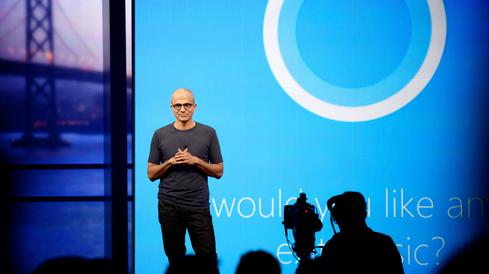Microsoft's Nadella: More Than Talk
Microsoft CEO Satya Nadella proves he can be a man of action with the biggest layoff in company history and other concrete steps to reshape Microsoft. Now what?

Microsoft lean and focused will infuse it with a startup's soul, as Nadella intends. But after talking about creating a "challenger mindset" at Microsoft, Nadella is now actively trying, at a very large scale, to make that happen.
On the enterprise and infrastructure sides, Microsoft clearly is performing well. Not everyone is persuaded by Nadella's cloud vision, but by focusing on hybrid products that bridge its on-premises server business with Azure, Microsoft is balancing its massive customer base and its future goals.
In these areas, Nadella's pet phrases make the most sense. His references to "ambient intelligence" and "ubiquitous sensing" tap clearly into the Internet of Things and its legion of environment-sensing, big-data-feeding connected devices -- the kinds of things for which Microsoft currently is preparing its cloud and data products. Likewise, his other talking points -- "productivity and platforms" and "mobile-first, cloud-first" products -- align to Microsoft's base catalogue much more easily than Ballmer's "devices and services" plot did. It makes sense for Microsoft to deliver services through the cloud, and to harness both Office's ubiquity and Microsoft's role as a major server player as foundations for delivery. It did not make sense to add a wholly unproven product category -- devices -- as a would-be strategic cornerstone.

Nadella's Nokia reductions include the elimination of the Nokia X smartphones, which layered Microsoft services on an Android base.
But things are murkier on the operating system and device side. Nadella is committed to putting Microsoft products on all platforms, iOS and Android included. He also remains committed to Windows, and to first-party devices such as the Surface Pro -- though he bent over backward reassuring investors last week that Microsoft isn't "in hardware for hardware's sake."
That's a lot to balance, especially for a company that's playing from far behind in mobile, and losing some of its consumer share in traditional PCs. Nadella's repeatedly described his intentions for a faster, less-bureaucratic, and more-collaborative management style -- and he'll need it. Microsoft might manage to juggle it all, but it's hard to not see the potential for strategic contradictions to arise.

Nadella has hyped Cortana and other contextually-aware technologies as game changers but Microsoft still has to prove its vision.
Nadella has begun to describe the actions he'll take to integrate what's left of Nokia's device business, and to make Windows a viable mobile platform. Some of his intentions are still vague, such as what specific benefits we'll see from the converged core that will soon power all versions of the OS, mobile and desktop alike. Will it just offer convenience to makers of simple apps, or will it transform the way we use and think of Windows across devices?
Nadella's declaration that devices will serve to "light up" Microsoft's digital experiences is appealing. It focuses on differentiating Microsoft's strengths, rather than keeping up with whatever Apple is up to. But if Nadella is going to offer first-rate Microsoft services on iOS and Android, what more can a Windows device add to "light up" the experience?
Microsoft has lightly fleshed out the idea. Even if Cortana becomes a cross-platform product, it will likely remain most closely tied to Windows Phone hardware, giving the digital assistant the ability to do more with contextual information, for instance. Nadella has also cited the Surface Pro 3's superlative digital inking experience as an example. Neither of these is necessarily a game changer but they prove a point: Even if Microsoft makes the best possible product it can for iOS or Android, devices that run those OSs are still limited in certain ways, which gives Microsoft room to explore new avenues.
Still, Nadella has a long way to go. On the enterprise side, Microsoft enjoys momentum today -- but Nadella has hinged tomorrow on ideas such as Delve, an Office 365 app that uses machine learning to discover what, how, and with whom you work, and to deliver information it thinks you'll need. It's tantalizing to think of a product that knows what you want before you do, but the concept is unproven and will test Nadella's promises that Microsoft will excel at data management and privacy. Nadella's device and Windows plans, meanwhile, are only just gaining focus, and will put pressure on the company's 2015 slate. That's when we should get our first full look at the company's post-Nokia device efforts and the next version of Windows.
IBM, Microsoft, Oracle, and SAP are fighting to become your in-memory technology provider. Do you really need the speed? Get the digital In-Memory Databases issue of InformationWeek today.
About the Author
You May Also Like






